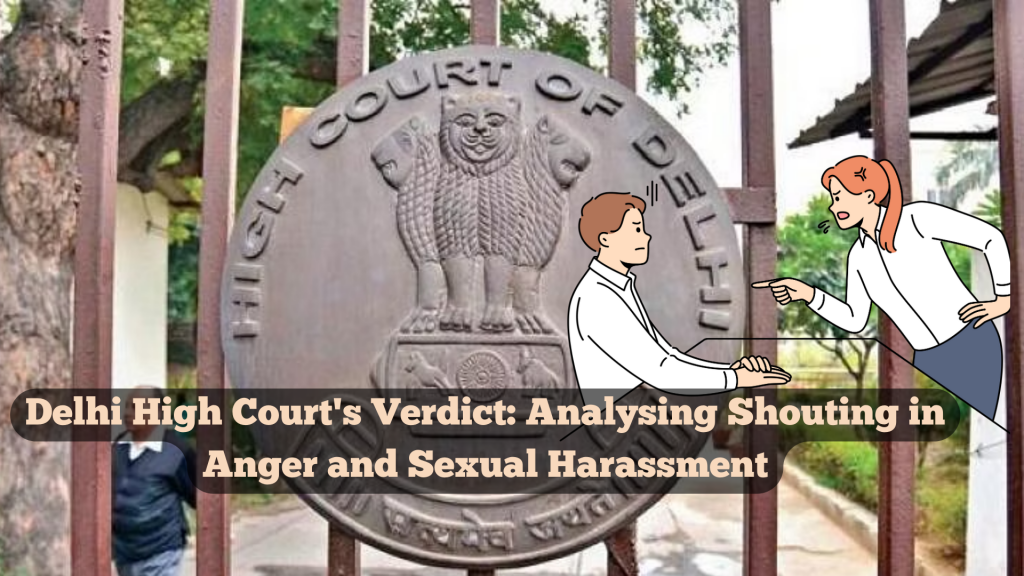
Delhi High Court’s Verdict: Analysing Shouting in Anger and Sexual Harassment
Judgement Given On : 11/09/2019
In a judgment dated November 19, 2019, the Delhi High Court rendered a pivotal decision in the matter of Abhilasha Dwivedi vs. Department of Women & Child Development NCT of Delhi and Ors. This ruling centres on the interpretation of sexual harassment within the framework of the Sexual Harassment of Women at Workplace (Prevention, Prohibition, and Redressal) Act, 2013 (hereafter referred to as the “Law”) and the handling of complaints related to alleged sexual harassment.
Factual Background:
Abhilasha Dwivedi (“the Petitioner”) worked as a Psychologist at the Observation Home for Boys-II (OHB-II) in Kingsway Camp, Delhi, under the employment of an NGO called “Expressions Children Home.” The Petitioner alleged harassment by OHB-II’s superintendent (“PK”), asserting that she was coerced into concealing malpractices. Additionally, she contended that PK’s behaviour towards her and other female staff was inappropriate. These allegations included instances where PK would undress in front of female staff, demand their company without reason, make them sit in his office for extended periods, engage in unwelcome staring, participate in vulgar conversations, and cultivate a hostile work environment.
A critical incident occurred on January 7, 2019, when PK verbally abused and threatened the Petitioner. She reported this incident to the Delhi Commission for Women (DCW) on January 8, 2019, and also uploaded her complaint on “SheBox”, an online portal managed by the Ministry of Women and Child Development. Despite these actions, the Petitioner received no response to her complaints.
Subsequently, on March 30, 2019, the Petitioner was notified of her transfer to CHB-I & II (Alipur) and instructed to report there on April 2, 2019. Apprehensive of the unfavourable working conditions at Alipur, she decided not to report after learning that PK had recently visited the facility. Instead, she requested permission to continue working at OHB-II until her complaint was thoroughly investigated.
On April 24, 2019, she received an email announcing the formation of an Internal Complaint Committee (ICC) and a notice for a hearing. Following this, she received a terse email from the ICC stating, “we will not help you.” Consequently, the Petitioner filed the present petition seeking various remedies.
Legal Analysis and Court’s Determination:
- Constitution of ICC: The Delhi High Court scrutinized the composition of the ICC and emphasized that the committee was not specifically constituted to address the Petitioner’s complaint but rather to handle all complaints of sexual harassment within the organization. The court expressed no reservations regarding the ICC’s integrity or independence. Furthermore, the court underscored that the presiding officer’s status as a colleague of PK did not compromise her independence. With the ICC comprising four members, the court found no basis for alleging bias against the Petitioner.
- Email Communication: Addressing the Petitioner’s concerns regarding the ICC’s cooperation, the court clarified that the email containing the phrase “we will not help you” was inadvertently sent automatically to all email addresses in the system. The court deemed the Petitioner’s apprehension unwarranted.
- Sexual Harassment Definition: The court delved into the Law’s definition of “sexual harassment,” which incorporates various unwelcome behaviours, including physical contact, sexual advances, demands for sexual Favors, sexually coloured remarks, and other non-consensual sexual conduct. The court specifically highlighted that the Petitioner’s claim of PK shouting at her in anger could not, in itself, be categorized as sexual harassment within the legal framework.
- Substantiation of Allegations: The ICC’s findings revealed that the Petitioner’s allegations were of a general nature and lacked substantiation. Notably, certain allegations mentioned in her petition were absent from her initial complaint. Additionally, these allegations did not contain any explicit sexual overtones, and the Petitioner had primarily reported instances of PK shouting at her in anger.
- Transfer Decision: In relation to the Petitioner’s transfer, the court declined to intervene, characterizing it as an internal management prerogative. However, the court encouraged the Petitioner to make a representation to the relevant authorities, outlining her concerns about the work environment at Alipur. Such a representation, if submitted, would warrant consideration by the appropriate authorities.
In conclusion, the Delhi High Court dismissed the Petitioner’s petition while providing the aforementioned legal analysis and clarifications. The ruling underscores the distinction between hostile work environments stemming from anger and those rooted in sexual harassment as defined by the Law. Additionally, it emphasizes the importance of substantiating allegations when filing complaints of sexual harassment. Lastly, the court acknowledges the authority of organizations in deploying human resources and suggests avenues for addressing concerns related to workplace conditions.
